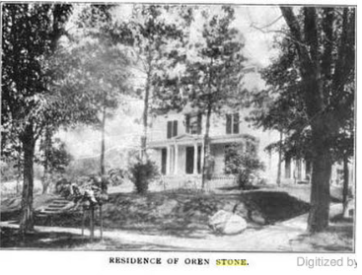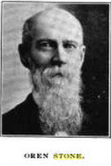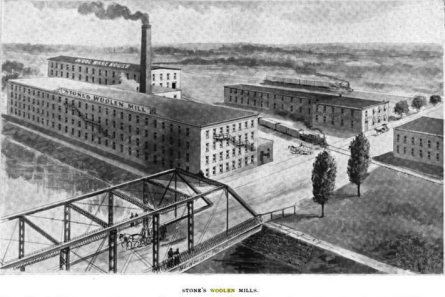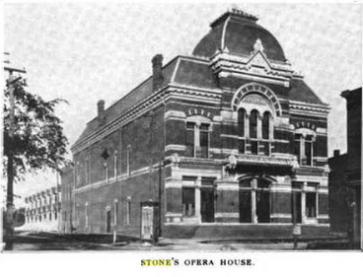My Dad shared, “I would ask Oren Stone why he started the Flint Woolen Mills and what brought him to Flint, Michigan?”
Photo credit – From Headlight Flashes along the Grand Trunk Railway System – Flint Michigan
The following are answers I have recreated in the voice of Oren Stone (my great-great grandfather)…
“I was born in Sennett, in Cayuga County, New York in 1833. My father and his ancestors going back many generations had grown up in Massachusetts. New England was becoming crowded and many New Englanders moved either directly to Michigan or, like my family, to upstate New York and then on to Michigan. As a boy we lived near the Erie Canal. It was easy for us to use the Erie Canal to move west to Oakland County Michigan when I was eleven years old, this was in 1844. As you may know, Michigan had just become a state in 1837.
“Later I moved around a bit, at about age 18 or so my parents helped me purchase a stock of goods and I set up a general store. I was also a local postmaster for a while. Eventually I settled in Flint in 1857 and set up a general store there. So that is how I got to Flint.
“Now about your other question about why I started the Flint Woolen Mill. Well, I was doing pretty well with my general store in Flint. Then the Civil War years created a strong demand of wool products. A lot of local farmers, including my uncle D. Hulbert Stone, started raising sheep, my uncle produced Merino wool. Well uncle Hulbert and other local farmers came to me and convinced me that they really needed a local woolen mill, since they were paying way to much to ship wool to the mills in New England. So I found a few local partners and we started the Flint Woolen Mill in 1867.
Photo credit – From Headlight Flashes along the Grand Trunk Railway System – Flint Michigan
“It started out as a small but very profitable business both for me and for our local farmers. In a few years I bought out my partners and became the sole proprietor. Later, I formed a life-long partnership with William Atwood. We changed the name to Stone, Atwood & Company, but we were still known locally and later nationally as Flint Woolen Mills. We picked up and bought out other partners over time.
“The mill continued to grow and was known for quality wool products, cashmere, Neptunus, and suit making wool. I even added a specific Pantaloons wool product line. Lots of local women worked in the mills and men worked as laborers. We had a nationwide distribution system. For a while we experimented with trying a cotton mill, but that did not really work out.

Photo credit – From Headlight Flashes along the Grand Trunk Railway System – Flint Michigan
“My son Dwight Stone, your grandfather, worked at Flint Mills for a while, but he seemed even more interested in our real estate and insurance business. So I am not sure whether the Flint Woolen Mills will stay in the family after I pass on.
“A couple of my other interests: I was active in a number of civic interests, it is important to give back to the community, and Flint has been good to our family. In 1888 I even served as the Mayor of Flint. I am very proud of restoring the Stone Opera House in Flint. It has deservedly had a good reputation throughout Michigan.
Photo credit – From Headlight Flashes along the Grand Trunk Railway System – Flint Michigan
“You may not know that I lost my first wife, your great-grandmother Susan C. Thompson. She died in 1870 when your grandfather Dwight was only 7. I remarried a wonderful woman Harriet Hayes Stewart. Her family members were very early settlers. Her parents arrived in Flint in 1833 and it is said that Harriet was one of the first white girls born in Flint.
“I hope this was helpful. Flint has been a great town for our family, I am proud to have played a key role in it development.
Author: Bruce Summers – Summoose Tales, Personal Historian, also
Board Member, Regions and Chapters Chair, the Association of Personal Historians.
Additional Credits:
Annie Payne – my Association of Personal Historians colleague who inspired the question by her Blog on what she would ask her Great Grandfather.
Also:
Extract: From, Stone Flint Woolen Mills, Flint, MI (Stone, Atwood & Co.) https://mail.google.com/mail/u/0/#inbox/15a590279d7d6e53?projector=1
As strange as the name sounds, “Stone Flint Woolen Mills”, the enterprise was started by a man named Oren Stone who was talked into creating a local woolen mill to help local sheep farmers sell their wool at profitable prices. Shipping the wool to the large mills on the east coast was not a simple matter in the late 1800’s which made it costly for the farmers. Stone opened the mill and before long, teamed up with William Atwood to rename the concern Stone, Atwood & Co. Stone’s products included blankets, flannel, a product they called “cassimeres” which might mean cashmere, mittens, hosiery and towards the end of the run of the operation a high-end “water-proof” fabric for ladies tailored suits named “Neptunus”.
And:
Extract: From Flint Woolen Mill Records https://www.umflint.edu/archives/flint-woolen-mills-records-0:
Sheep raising was one of the earliest agricultural specializations in Genesee County. Due to the heightened demand for wool during the Civil War, prices increased dramatically. Farmers in the county complained of the unfair prices they were receiving for the commodity and induced Oren Stone (born July 24, 1833 in Auburn, N. Y., died April 20, 1897 in Flint), owner of a general store, to establish a woolen mill. In 1867 he began the Flint Woolen Mills, with stock in the company being held by a number of owners. By 1870 he was sole owner.
In 1876, having survived the economic troubles of the period, Stone added William A. Atwood (born April 11, 1835 in Newfane, N. Y., died April 11, 1908 in Flint) and, at least by 1879, Charles H. Bowker as minority partners. The company then was known as Stone, Atwood, and Company, although the physical operation continued to be called the Flint Woolen Mills. Atwood’s share ranged from 1/4 in 1879 to 5/13 in 1896. Bowker left the company in 1882 or 1883; J. N. Blake joined as a minority partner in 1885 to 1890 and Edwin W. Atwood, William’s son, from 1895.
Atwood was part owner at least until 1901. By 1905 David D. Aitken and John E. Shortle had become owners. The Flint Woolen Mills folded between 1910 and 1913.
SCOPE AND CONTENT
This collection complements the larger Flint Woolen Mills collection at the Michigan Historical Collection at the Bentley Historical Library. It consists of records documenting the financial and manufacturing aspects of the firm’s history. There is little or no material reflecting the personal lives or interests of the mill’s owners.



